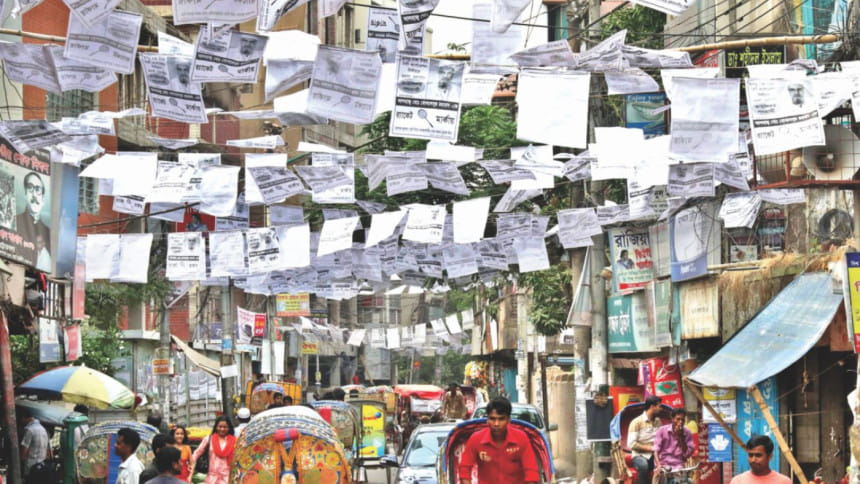A free and fair election may break the ice

THE election schedules for Dhaka North, Dhaka South and Chittagong City Corporation have been declared. April, 28th is the voting date. Almost all political parties including the major ones are in the race through candidates backed by them. In addition, there are a good number of independent candidates.
Recently, a debate has been going on about local government elections. Should it be partisan and contested on political party lines in place of the present non-partisan system? The logic in favour is that in reality local government elections are contested on party lines. Political parties give nomination and declare support to a single candidate and force other party aspirants to refrain or withdraw. Candidates who refuse face disciplinary action. Contesting party candidates are not provided with the party symbol as it is legally a non-party election but they use photographs of prominent party leadership in posters, festoons and other publicity materials. Party workers are engaged in electioneering activities in favour of the party candidate.
The reason behind keeping it outside party based election is that the people elected would require holding executive power. They would be taking decisions and will be responsible for implementing works related to public interest. In order to maximize public benefit and ensure good governance neutrality and an uncompromising attitude in upholding interest of people are essential.
For the same reason there needs to be a separation between the government and the government party. When a party person is appointed in an executive function like minister, he/she is needed by constitution to perform duties neutrally. Before taking responsibility they are to make commitment by taking an oath as "I will do right to all manners of people according to law, without fear or favour, affection or ill-will". Present day reality however is quite contradictory. Not only are most of the party ministers breaking their vows but they are being encouraged and sometimes forced to do so by their controlling authorities.
Now if the local government elections are made partisan officially, it could be almost impossible for the elected people to perform tasks maintaining impartiality and prioritizing public interest above that of party people. It will look like an encouragement of a bad practice rather than trying to curb it which should be the goal.
Except Dhaka, all other city corporation elections including Chittagong took place more or less on time and were run by elected mayors. The last Dhaka city corporation election was held in April, 2002. The tenure was for five years and the next election was due in 2007. It was not done under the pretext of some legal complexities. The existing mayor continued as there was no legal provision to hand it over to anybody but the next elected mayor. People started to think that the governement was afraid to face the election as it apprehended a defeat and was just making up excuses. Ultimately, the government amended the Dhaka City Corporation law in November, 2011, to make provision for handing over the mayoral position to someone other than the next elected mayor. The city corporation was divided into two parts, Dhaka North and South in the same amendment.
Ultimately, the mayor elected in April, 2002 relinquished his position in November, 2011 after serving for more than nine and half years. From that time till date for more than three and half years Dhaka City Corporations have been administered by government officials. No elections were called. It was widely believed that it was to ensure victory of the ruling party candidates.
Some people considered the holding of the city corporation elections as a trap for the BNP-led opposition alliance. The logic was that if they participated in the election the anti-government movement would lose steam and the situation could be normalized without any positive result. But, the circumstances were already moving towards normalcy.
There was speculation that the government wanted to win the election without any formidable opposition. It was assumed that the BNP-led opposition would boycott as the main issue was that a fair election was not possible under this government. Now the decision of the BNP to take part has put the government in an awkward position. Some people think that the government might try to win these elections by any means influencing the Election Commission, government officials etc. That would have dire consequences for the nation.
Others consider this as a good will gesture from government side. By participating, the BNP-led opposition will get an honourable exit from the violent movement they have trapped themselves in.
If that be the case, now that the BNP has decided to take part, it would be the responsibility of the government to extend sincere cooperation for holding a free, fair and acceptable election for the sake of confidence building. If the ultimate aim is to establish political stability to achieve sustainable peace and prosperity, effective measures are to be initiated by the government to resolve the conflicts as early possible.
The writer is a former Minister and Presidium Member, Jatiya Party.

 For all latest news, follow The Daily Star's Google News channel.
For all latest news, follow The Daily Star's Google News channel. 



Comments